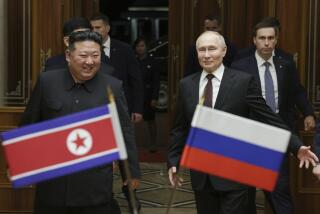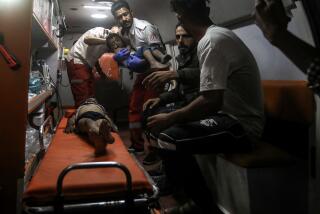N. Korea Visitors Tell of ‘Famine in Slow Motion’
- Share via
BEIJING — After a weeklong inspection tour of North Korea, a team of U.N. food relief experts said Monday that it found the country in a state of “near famine” but saw no evidence of starvation deaths, cannibalism or military food seizures reported by refugees and other travelers in Asia’s most secretive state.
Tun Myat, leader of the U.N. World Food Program team that left North Korea on Sunday after traveling across the country by train and inspecting ports and hospitals, described the situation as “famine in slow motion.”
“This is not a case like you see in Somalia or Sudan,” Myat said at a news conference here. “This is not a desert. There are trees and water. There is no war, no large displacements of people.”
The U.N. team’s observations do not match some portrayals of hardship and starvation related by ethnic Korean Chinese and North Korean refugees who have flooded into Chinese border cities in recent months. Some refugees said they witnessed hundreds of starvation deaths. Others reported rogue North Korean army units roaming the countryside and stealing food at gunpoint.
The stories are fueled by the secretive nature of North Korea’s isolationist regime, which allows foreign visitors, including the U.N. team, only under strict supervision. No reporters have been allowed into the areas said to be most affected by food shortages.
“We saw no case of the military taking food away from civilians,” Myat said. “And frankly, I would find that difficult to believe.”
Although the group passed through some of the areas believed to be most affected by the crisis, it did not go to remote rural areas that trains cannot reach.
Brigitta Karlgren, a World Food Program official based in Pyongyang, the capital, said she had traveled extensively by rail and car in North Korea in recent months without seeing signs of starvation deaths. “It is not like it was with the refugees in Cambodia in 1975,” Karlgren said. “They died by the roadside there. I saw them.”
But the experts described North Korea as a crumbling, broken country where local governments sell scrap iron for food and hungry peasants eat cakes milled from corncobs and pine bark--a country that desperately needs massive international food aid to survive.
“Our overwhelming impression,” Myat said, “is one of a country under severe hardship, under great strain from food shortages and near-famine conditions. They are getting by, one way or another.”
Myat said the inspection team visited one northern province with a population of 2.2 million that on May 3 had only 600 tons of grain left in its warehouses. Peasants there are eating seaweed, corncobs, mushroom stems and other grain substitutes, including some with “unlikely nutritional value,” to stave off their hunger.
“What in other countries would have been thrown away or used for animal food were being milled and eaten,” Myat said. “How long until the dire effects of malnutrition take hold I cannot tell you. But possibly because of these alternative foods, we are not yet seeing the sort of deaths we otherwise might already have expected.”
According to assessments by the World Food Program and the U.N. Food and Agriculture Organization, North Korea has a food deficit of 2.3 million tons of grain. Massive floods destroyed much of the country’s harvests in 1995 and 1996.
The North Korean government has said it will obtain 1 million tons of grain in barter and trade with other countries. It has appealed to the United Nations and donor countries for the remaining 1.3 million tons. So far, the World Food Program has committed itself to delivering 200,000 tons in coming weeks.
Myat, director of transportation and logistics for the World Food Program, said two of the initial seven U.N. grain ships have already arrived at North Korean ports. He said a 70,000-ton shipment of corn is en route from China. Also, the South Korean Red Cross said Monday that it will begin delivering 15,000 tons of corn to North Korea next week.
The U.N. official reported that the North Korean distribution system is still functioning well enough to distribute the emergency food.
However, the U.N. team said it found the North Korean infrastructure in a seriously dilapidated state and the government in Pyongyang in deep denial about the nature and causes of the country’s massive problems. “They [Pyongyang officials] continue to see this as a passing phase,” Myat said. “They are not looking at it as a long-term problem.”
In pointing out the derelict condition of the country’s infrastructure, the U.N. officials said the 360-mile train trip from Pyongyang to the northeastern port city of Chongjin took 29 hours because of frequent electricity failures on the lines.
Peasants desperate to find food for their families rode on the roofs of trains, something that has not been seen before in the highly disciplined North Korean state, the officials added. When the trains pulled into stations, the peasants scattered along the tracks rather than present papers to authorities at the gates.
The experts said they saw countryside where farmers used every square inch of arable land to plant crops. But they worry that the clear-cutting and burning of forests to create more farmland have caused massive erosion.
Even worse, said Myat, the streams and riverbeds seemed full. “I fear there could be floods again,” he said.
More to Read
Sign up for Essential California
The most important California stories and recommendations in your inbox every morning.
You may occasionally receive promotional content from the Los Angeles Times.










